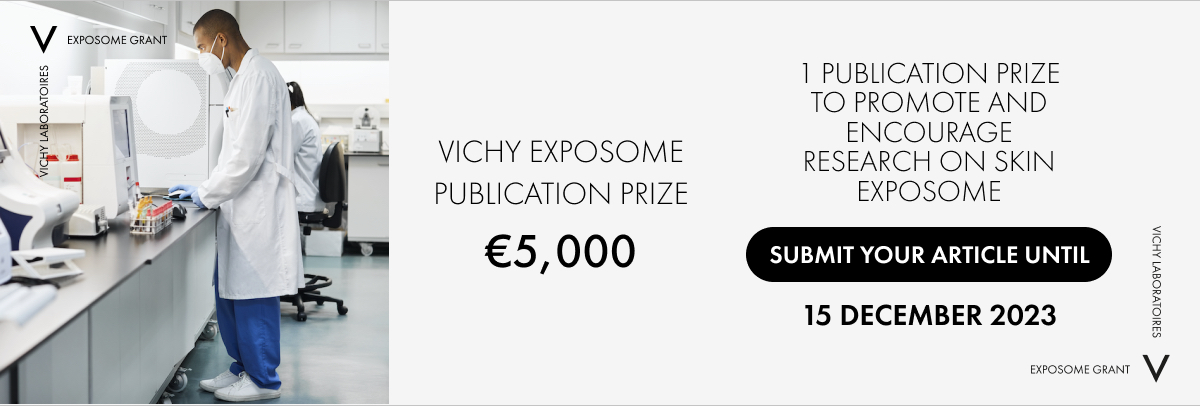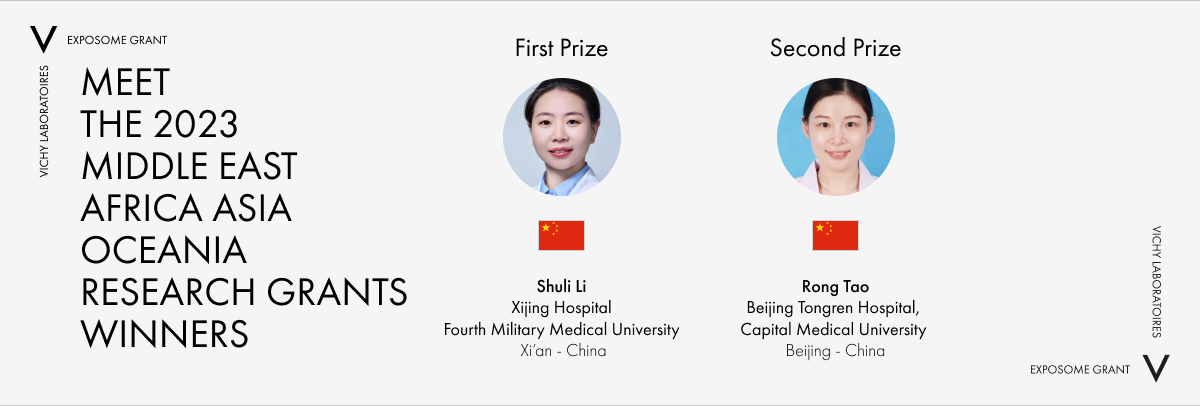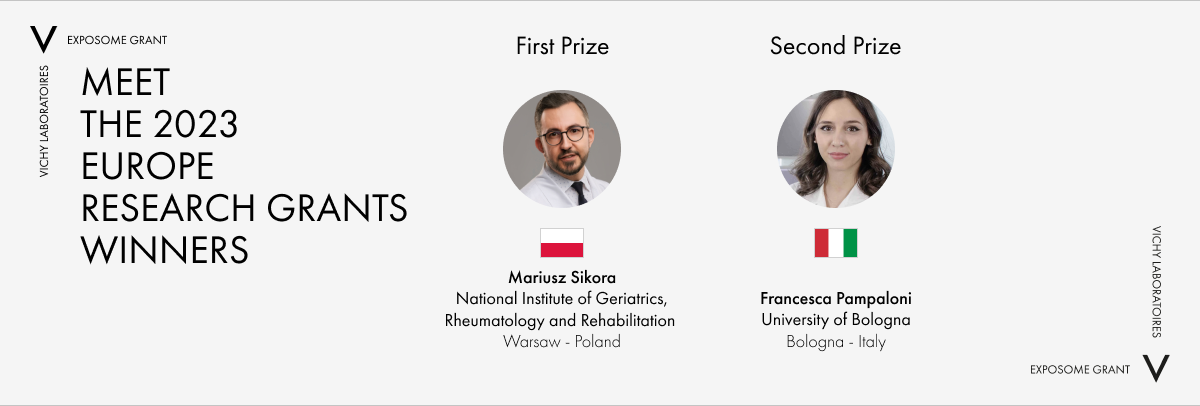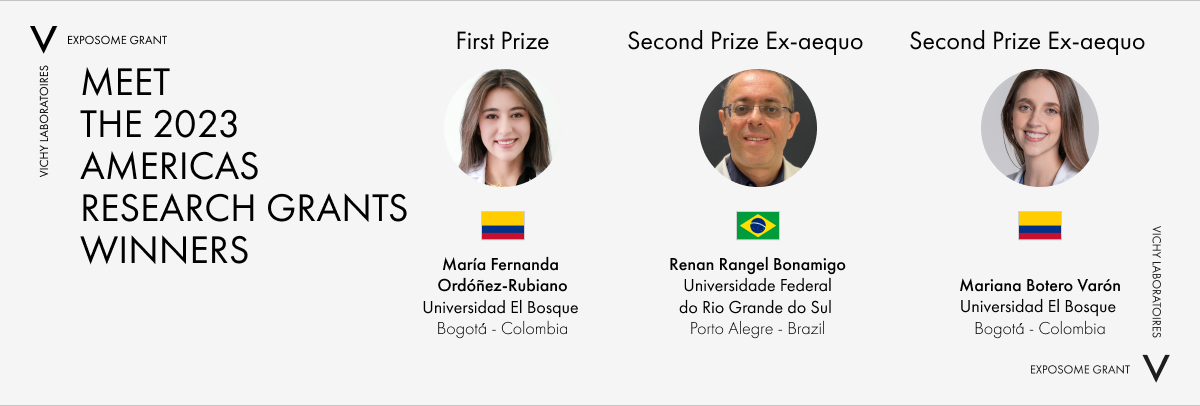Apply now to the Publication Prize
Download the Exposome Publication Prize Terms & Conditions
Your curriculum vitae should contain:
- Name
- Business address with telephone number and email address,
- Education and training,
- Current and past professional positions,
- List of most important publications in the past five years.
No more than 3 pages
before Friday December 15, 2023, 23:59 CET
The application must include:
- Your curriculum vitae
- The published paper, or the accepted paper and the letter of acceptance from the publisher
- A copy of the Publication Prize Terms & Conditions including your paper presentation formatted according to the presentation of application section of those terms & conditions
All requested elements must be sent by e-mail only to [email protected]
What is the exposome?
The exposome encompasses all the factors the human body is exposed to from the prenatal period onwards. It complements the genome.
For this highly complex interaction, the term exposome was coined by Dr. Christopher Wild the International Agency for Research on Cancer, World Health Organization.
The skin exposome refers to the cumulative lifetime exposure of an individual to environmental factors, like UV radiation or pollution, lifestyle factors like nutrition, stress, tobacco and hormonal factors like hormonal cycle and their variations, that can impact the health of their skin.

The grants
Six research grants & one publication prize
With the Vichy Exposome Grant, Vichy Laboratoires support research into the skin and scalp exposome with €80,000 awarded across six regional research grants and one publication prize.
Competition open for 3 regions
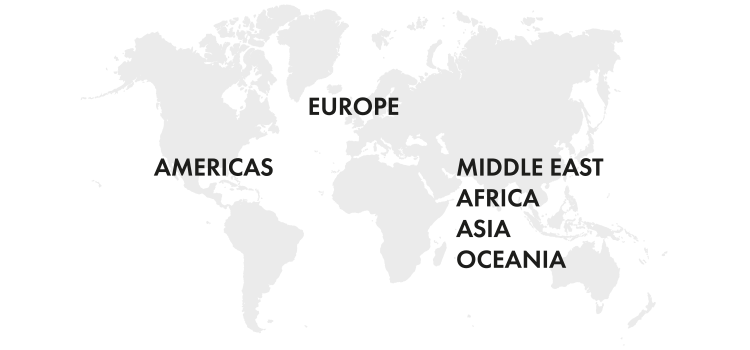
Two research grants per region
A total of six research projects in the field of exposome and skin or scalp

Applications for the Research Grants are now closed.
One publication prize
The Exposome Publication Prize will recognize the principal author of an outstanding paper published or accepted between January 2022 and November 2023 on original research in the field of hormones and skin or scalp.
Only publications related to sex hormones linked to skin and scalp disorders, including acne and menopause, will be considered.

The Juries
The Exposome Grant Jury
Applications for the research grants will be reviewed by an independent jury of experts chaired by Professor Jean Krutmann (Germany) and comprised of Prof. Chunying Li (China), Dr. Caradee Wright (South Africa), Prof. Thierry Passeron (France), and Prof. Sergio Schalka (Brazil).

Prof. Jean Krutmann, Chair

Prof. Chunying Li

Dr. Caradee Wright

Prof. Thierry Passeron

Prof. Sergio Schalka
The Publication Prize Jury
One dedicated jury will take care of selecting one outstanding paper in a peer-reviewed journal on original research in the field of hormones and skin or scalp, published between June 2022 and May 2023 .

Dr. Eugenia Cappetta

Prof. Steven Goldstein

Prof. Jerry Tan
Application conditions for the publication prize
Vichy Laboratoires are inviting board certified dermatologists and dermatology residents to apply to the Vichy Exposome Publication Prize.
The Vichy Exposome Publication Prize will reward the principal author of one outstanding paper in a peer-reviewed journal on original research in the field of hormones and skin or scalp.
Only publications related to sex hormones linked to skin & scalp disorders, including acne and menopause, will be considered.
Review articles will be accepted.
Eligible papers must have been published or accepted for publication between January 1st, 2022, and December 15th, 2023.
Applications related to projects involving animal research, or pediatric population under 6 years, or projects investigating any product used by or administered to human beings (including food supplements, herbal products, medical devices, medicinal or cosmetic products…), will not be considered.
Key Dates and Contact
Applications for the Research Grants are now closed. Winners will be announced at the 32nd EADV Congress in October 2023 in Berlin.
Applications for the 2024 Research Grants will open soon!
The deadline for application for the Publication Prize is extended to 15 December 2023. The awardee will be announced at the 2024 AAD annual meeting.
For any questions, please email [email protected]
2023 Exposome Grant
Winners
2023 RESEARCH GRANTS MIDDLE EAST AFRICA ASIA OCEANIA

First Prize
€15,000

Shuli Li, MD, PhD
Xijing Hospital
Fourth Military Medical University
Xi’an - China

2nd Prize
€10,000

Rong Tao, MD
Beijing Tongren Hospital
Capital Medical University
Beijing - China
“THE EFFECTS OF FOLLICULAR SKIN MICROBIOTA ON HAIR AGING: NEW UNDERSTANDING ON THE PATHOGENESIS OF HAIR GRAYING AND LOSS”
Xijing Hospital
Fourth Military Medical University
Xi’an - China
Hair graying and loss are prominent aging phenotypes that affect the physical beauty and quality of life in most elderly population. Although extensive efforts have been made to understand the mechanism of hair aging, the exposure factors and the cellular activities that underlie the process of hair aging are still largely unknown. Recently, increasing progression points to potential involvement of the cutaneous microbiome in hair aging: 1) the microbiome of the hair follicle is crucial for maintaining the stem cell niche and hair growth; 2) the microbiome dysbiosis has been proved as an additional hallmark and biomarker of aging; 3) the abnormal skin microbiome has been implicated to play a major role in several environmentally determined skin diseases or hair follicle-associated disease such as hidradenitis suppurativa.
This project aims to investigate the changes that occur in the hair follicle skin microbiome as hair ages using microbiome sequencing in patients with hair graying/loss and healthy controls, and by using Single-cell RNA sequencing to explore how this complex relationship between the skin microbiome and cellular activities in the hair follicle can contribute to hair graying and loss. Our findings may provide novel data on the microbiological diversity of the skin, uncover the involvement of follicular skin microbiota in the process of hair aging, and may lead to the development of innovative treatments for hair graying and loss.
"COMPARATIVE ANALYSIS OF THE MICROBIOME OF SEBORRHEIC DERMATITIS BETWEEN HIGHLANDS AND LOWLANDS IN CHINA"
Beijing Tongren Hospital
Capital Medical University
Beijing - China
According to our previous studies, there are significant differences in facial microbial colonies, especially in the relative abundance of Malassezia among healthy individuals at different altitudes. The disease diversity of seborrheic dermatitis is positively correlated with the relative abundances of Malassezia, Staphylococcus, and Corynebacterium. However, there is still a lack of evidence on the impact of environmental factors, especially altitude, on shaping the seborrheic dermatitis facial microbiome and skin barrier function.
We would like to recruit 80 patients with seborrheic dermatitis from highlands and lowlands in China. Skin swabs were collected from both affected and unaffected areas of the participants. All samples were subjected to ITS1 and V3V4 16S rRNA region amplicon sequencing and metabolomic analysis. We aim to observe the impact of altitude on the microbiome and skin barrier function in seborrheic dermatitis and provide clinical research data for further investigation into the pathogenesis of this disease.
2023 RESEARCH GRANTS EUROPE

First Prize
€15,000

Mariusz Sikora, MD, PhD
National Institute of Geriatrics,
Rheumatology and Rehabilitation
Warsaw - Poland

2nd Prize
€10,000

Francesca Pampaloni, MD
University of Bologna
Bologna - Italy
"THE ROLE OF TRIMETHYLAMINE – AN AIR POLLUTANT AND GUT MICROBIOTA-DERIVED METABOLITE – IN THE PATHOGENESIS OF ATOPIC DERMATITIS AND PSORIASIS"
National Institute of Geriatrics,
Rheumatology and Rehabilitation
Warsaw - Poland
There is an increasing awareness that air pollution may increase the risk of development and exacerbation of dermatological diseases. The harmful impact of airborne pollutants on skin diseases might be derived from different pathomechanisms including skin barrier dysfunction, oxidative damage, immune stimulation, and dysbiosis.
Trimethylamine (TMA) is a universal air pollutant as well as active molecule produced by microbiota. So far, TMA and its metabolites were evaluated in cardiovascular disorders. Although, their harmful pleiotropic effects may also affect skin.
Therefore, the aim of this project is to examine the role of trimethylamine (an air pollutant and gut microbiota-derived metabolite) in different inflammatory diseases, namely psoriasis and atopic dermatitis. In vitro studies evaluate the role of different TMA concentrations on T lymphocytes activation, proliferation, and cytokines synthesis. Role of saliva as an additional source for TMA concentration assessment will be also studied.
Our data might yield a new insight into the role of exposome in inflammatory diseases pathogenesis, which contributes to development of novel therapeutic strategies.
"IMPACT OF MENOPAUSE ON SEVERITY OF ANDROGENETIC ALOPECIA, QUALITY OF LIFE, ANXIETY AND DEPRESSION"
University of Bologna
Bologna - Italy
Androgenetic alopecia (AGA) is characterized by a progressive miniaturization of hair follicles caused by androgens in genetically susceptible women and men. Menopause is a critical stage of female reproductive ageing and health, and it is defined as the permanent cessation of menstruation resulting from the loss of ovarian follicular activity. Skin and hair involvement often receive less attention than other menopausal symptoms despite having a significant negative effect on quality of life. Moreover, depressive and anxiety symptoms are more common during postmenopausal stage. The hormone replacement therapy is not indicated for skin and hair symptoms alone due to the low risk–benefit balance.
The aims of our study are (i) to evaluate the impact of menopause on the severity of AGA, (ii) to investigate the clinical and trichoscopy pattern of AGA in post-menopausal female (iii) to evaluate the impact of menopause on QoL, depressive and anxiety symptoms in patients with AGA and (iv) to compare AGA clinical and trichoscopy pattern and QoL, anxiety and depressive symptoms in those treated with hormone replacement therapy versus those not treated in a real world setting.
2023 RESEARCH GRANTS AMERICAS

First Prize
€15,000

María Fernanda
Ordóñez-Rubiano, MD
Universidad El Bosque
Bogotá - Colombia

2nd Prize Ex-aequo
€10,000

Renan Rangel Bonamigo, MD
Universidade Federal
do Rio Grande do Sul
Porto Alegre - Brazil

2nd Prize Ex-aequo
€10,000

Mariana Botero Varón, MD
Universidad El Bosque
Bogotá – Colombia
« INSIDE – OUT, A DIFFERENT VIEW OF THE SKIN EXPOSOME: EXAMINING THE INFLUENCE OF INTESTINAL PARASITE COLONIZATION OR INFECTION ON THE GUT BACTERIAL MICROBIOME AND THE SEVERITY OF ATOPIC DERMATITIS »
Ordóñez-Rubiano, MD
Universidad El Bosque
Bogotá - Colombia
The study of the skin-gut axis is increasingly important due to its potential therapeutic implications and lifestyle interventions that can yield results in skin health1 One of the most prevalent skin diseases with important public health implications is atopic dermatitis (AD) and, recently, the influence of the gut and its microbiome on this disease has emerged as a novel, dynamic and promising field of research2
The effect of parasites on AD remains unclear. These microorganisms have been poorly studied, and their role in the disease is far from being understood3 Some studies indicate that infections with certain helminths may provide protection against allergic disorders4, while others may increase the risk of developing the disease5 Associations between AD and protozoa has also been observed6
The objective of this study is to investigate the interaction between intestinal parasites and the gut bacterial microbiome and understand how this component of the "internal" exposome influences the skin-gut axis in the disease. This will be accomplished through extensive sociodemographic characterization, examination of relevant variables associated with the disease, and analysis of the "external" exposome in individuals with varying severities of AD.
Additionally, stool samples will be collected for the diagnosis of intestinal parasites (by microscopy and PCR) and the analysis of the bacterial microbiome (by NGS). The obtained data will undergo comprehensive bioinformatics analysis to characterize the "internal" exposome in detail.
1. Mahmud MdR, Akter S, Tamanna SK, et al. Impact of gut microbiome on skin health: gut-skin axis observed through the lenses of therapeutics and skin diseases. Gut Microbes. 2022;14(1). doi:10.1080/19490976.2022.2096995
2. Lee SY, Lee E, Park YM, Hong SJ. Microbiome in the Gut-Skin Axis in Atopic Dermatitis. Allergy Asthma Immunol Res. 2018;10(4):354-362. doi:10.4168/aair.2018.10.4.354
3. Feary J, Britton J, Leonardi-Bee J. Atopy and current intestinal parasite infection: a systematic review and meta-analysis. Allergy. 2011;66(4):569-578. doi:10.1111/j.1398-9995.2010.02512.x
4. Salem I, Ramser A, Isham N, Ghannoum MA. The Gut Microbiome as a Major Regulator of the Gut- Skin Axis. Front Microbiol. 2018;9. doi:10.3389/fmicb.2018.01459
5. Ellis SR, Nguyen M, Vaughn AR, et al. The Skin and Gut Microbiome and Its Role in Common Dermatologic Conditions. Microorganisms. 2019;7(11). doi:10.3390/microorganisms7110550
6. McKenzie C, Tan J, Macia L, Mackay CR. The nutrition-gut microbiome-physiology axis and allergic diseases. Immunol Rev. 2017;278(1):277-295. doi:10.1111/imr.12556
« ASSESSING PATIENTS WITH ROSACEA COMORBIDITIES: FOOD HABITS, INTESTINAL MICROBIOTA AND SERUM CATHELICIDIN LEVELS »
Universidade Federal
do Rio Grande do Sul
Porto Alegre - Brazil
Rosacea is a common chronic inflammatory skin and eye disease that primarily affects the center of the face (although extra-facial manifestations occur, also). It is characterized by symptoms such as erythema, edema, telangiectasias, papules and pustules. While the exact causes of rosacea are not fully understood, it is believed to be influenced by various factors including immunological and genetic factors, vascular dysregulation, environmental triggers, dietary factors, and the action of microorganisms. Recent studies have also highlighted the role of the intestinal microbiome in the development of rosacea, possibly through the stimulation of the mTOR pathway. There is an increased incidence of rosacea in individuals with gastrointestinal, neurological, and cardiovascular diseases and patients with rosacea have been found to have higher levels of cathelicidins (antimicrobial and pro-inflammatory peptides).
Building upon this background, the present project aims to investigate the relationship between comorbidities, microbiome profile, serum cathelicidin levels, and diet in patients with rosacea. This case-control study will involve the clinical and laboratory evaluation of patients with rosacea and include the analysis of fecal samples to determine the composition of the intestinal microbiota, a food questionnaire to assess dietary patterns, and the measurement of serum cathelicidin levels. These investigations are intended to provide a better understanding of the underlying mechanisms involved in the pathogenesis of rosacea, as well as its potential systemic implications.
« EXPLORING THE EXPOSOME: A COMPREHENSIVE APPROACH TO THE IMPACT OF INTESTINAL PARASITES COLONIZATION OR INFECTION IN THE PRODUCTION OF SECRETORY IGA IN ATOPIC DERMATITIS AND ITS SEVERITY »
Universidad El Bosque
Bogotá – Colombia
Parasites have been proposed as an important component of the exposome in Atopic Dermatitis (AD), mainly because of their capacity to regulate the immune response1.
However, the evidence supporting this proposal is based on epidemiological studies, where contradictory results have been found in some populations2 Very few studies have been conducted to evaluate the impact of intestinal parasites on skin immunology, so the role of this component of the exposome in the pathophysiology of AD is still poorly understood3 Immunoglobulin A (IgA) is the most important immunoglobulin in the mucosal system4 The secretory component of IgA (SIgA) has been identified as a protective factor in some inflammatory diseases5 The changes and the effect that intestinal parasites and other components of the exposome may have on SIgA levels in AD have not been studied.
The objective of this study is to explore the impact of parasites and other components of the exposome on SIgA levels in patients with AD stratified by severity. This will be achieved through an extensive and in-depth analysis of key exposome components that may impact immunoglobulin levels and parasites. Subsequently, direct parasitological diagnosis will be performed on stool samples, and serum SIgA quantification will be measured using ELISA. Statistical analyses will be conducted to identify exposome variables associated with potential changes in SIgA, while taking disease severity into account.
1. Okada H, Kuhn C, Feillet H, Bach JF. The ‘hygiene hypothesis’ for autoimmune and allergic diseases: an update. Clin Exp Immunol. 2010;160(1):1-9. doi:10.1111/j.1365-2249.2010.04139.x
2. Briggs N, Weatherhead J, Sastry KJ, Hotez PJ. The Hygiene Hypothesis and Its Inconvenient Truths about Helminth Infections. PLoS Negl Trop Dis. 2016;10(9):e0004944. doi:10.1371/journal.pntd.0004944
3. Flohr C, Quinnell RJ, Britton J. Do helminth parasites protect against atopy and allergic disease? Clinical & Experimental Allergy. 2009;39(1):20-32. doi:10.1111/j.1365-2222.2008.03134.x
4. Cerutti A, Rescigno M. The Biology of Intestinal Immunoglobulin A Responses. Immunity.
2008;28(6):740-750. doi:10.1016/j.immuni.2008.05.001
5. Mantis NJ, Rol N, Corthésy B. Secretory IgA’s complex roles in immunity and mucosal homeostasis in the gut. Mucosal Immunol. 2011;4(6):603-611. doi:10.1038/mi.2011.41
Previous Winners
Find out more about previous Vichy Exposome Grant winners
Since its launch in 2016, the Vichy Exposome Grant has supported 24 scientists globally, furthering the field of exposome science in relation to human skin and scalp disorders.
2022 Publication Prize

€5,000

Maria Eugenia Balaña, PhD
Instituto de Ciencia y Tecnologia
Dr. César Milstein
Buenos Aires, Argentina
Ceruti JM, Oppenheimer FM, Leirós GJ, Balañá ME.
Androgens downregulate BMP2 impairing the inductive role of dermal papilla cells on hair follicle stem cells differentiation. Mol Cell Endocrinol
. 2021 Jan 15;520:111096.
Instituto de Ciencia y Tecnologia
Dr. César Milstein
Buenos Aires, Argentina
Abstract
Hair follicle cyclical regeneration is regulated by epithelial-mesenchymal interactions. During androgenetic alopecia (AGA), hair follicle stem cells (HFSC) differentiation is impaired by deregulation of dermal papilla cells (DPC) secreted factors. We analyzed androgen influence on BMPs expression in DPC and their effect on HFSC differentiation to hair lineage.
Androgens downregulated BMP2 and BMP4 in DPC spheroids. Addition of BMP2 restored alkaline phosphatase activity, marker of hair-inductivity in DPC, and DPC-induced HFSC differentiation, both inhibited by androgens. Concomitantly, in differentiating HFSC, an upregulation of BMPRIa and BMPRII receptors and nuclear β-catenin accumulation, indicative of Wnt/β-catenin pathway activation, were detected.
Our results present BMP2 as an androgen-downregulated paracrine factor that contributes to DPC inductivity and favors DPC-induced HFSC differentiation to hair lineage, possibly through a crosstalk with Wnt/β-catenin pathway.
A comprehensive understanding of androgen-deregulated DPC factors and their effects on differentiating HFSC would help to improve treatments for AGA.
READ MORE
2022 Research Grants Asia Pacific

First Prize €15,000

Ge Peng, MD
Juntendo University
Tokyo, Japan

2nd Prize €5,000

Wenyu Wu, MD
Fudan University
Shanghai, China

3nd Prize €5,000

Chanisa Kiatsurayanon, MD
Ministry of Public Health
Bangkok, Thailand
« Exploring the protective role of betacellulin, a ligand for the epidermal growth factor receptor, in staphylococcus aureus-induced skin barrier dysfunction and inflammation »
Juntendo University
Tokyo, Japan
Atopic dermatitis (AD) is a chronic inflammatory skin disorder characterized by intense itching, dysregulated immune responses, disruption of the skin barrier, and skin dysbiosis, including Staphylococcus aureus (S. aureus) overexposure. Hence, AD is uniquely poised for skin exposomal research. Betacellulin (BTC), a peptide ligand of epidermal growth factor receptor (EGFR), regulates skin proliferation and hemostasis and protects against inflammation in pancreatitis. Moreover, EGFR signaling relieves S. aureus-induced inflammatory signals in human epidermal keratinocytes and AD-like skin lesions in mice. However, the potential role of BTC on exposure-induced skin barrier dysfunction and inflammation in AD remains unclear.
To determine the role of BTC in skin exposome regulation, I will establish S. aureus-induced AD-like human skin equivalent models to examine the alteration of S. aureus inoculation, skin barrier function and skin inflammation following treatment with BTC in the presence or absence of an EGFR inhibitor, erlotinib. While most studies focus on cytokine-targeted therapies, this study instead aims to identify new therapeutic targets that directly regulate S. aureus exposure to inhibit inflammation and restore skin barrier function through EGFR regulation. The proposed study will address the significant unmet need to improve AD management through an exposomal approach.
« The impact of exposome on scalp health of chinese women »
Fudan University
Shanghai, China
Scalp health has lately attracted the public attention, because of its contribution to optimal hair growth, which is crucial to our physical appearance and self-perception. As the first line of physical defense against stressors, scalp and hair are affected by multiple exposome factors. Both internal factors such as aging and hormone and external factors like UV radiation (UVR) may influence scalp health.
Dandruff and seborrheic dermatitis (D/SD) are a common scalp condition frequently seen in clinical practice and have a huge impact on our quality of life. The exact pathophysiology of D/SD is poorly understood. Besides Malassezia spp. and its interaction with skin immune system, environmental factors including UVR, and low vitamin D levels might also be involved in D/SD. It is reported that scalp and hair in D/SD patients exhibit clear signs of oxidative stress.
Currently the systematic effects of exposome on scalp health in Asian populations remain unknown. To fill the gap, we aim to investigate the scalp condition of the Chinese female population. Using D/SD as a model, we will study the combined effect of external (UVR) and internal exposure factors (hormone, age, vitamin D) on scalp health. These findings will help better understand the impact of exposome on scalp health, particularly for the population in China.
« Roles of host defense (antimicrobial) peptides human β-defensins on human dermal fibroblasts in uv-induced photoaging »
Ministry of Public Health
Bangkok, Thailand
Host defense (antimicrobial) peptides (HDPs) constitute a crucial part of the epidermal innate immunity and function as the foremost barrier against external environmental threats. Human β-defensins (hBDs), one of the major families of HDPs found in mammals, are multi-functional cationic peptides expressed by various cell types including cells in the skin epithelia. Although hBDs are known to exhibit many immunomodulatory functions, the photo-protective effects of hBDs have never been explored before in the literature. Therefore, we aim to investigate the potential roles of hBDs on human dermal fibroblasts in UVB-induced photoaging. Discovering novel functions of hBDs will not only implement the basic knowledge in immunodermatology, but also enlighten physicians to develop promising treatment strategies for patients with photodermatoses.
2022 Research Grants Europe North America

First Prize €15,000

Andrea Teufelberger, PhD
Medical University Graz
Graz, Austria

2nd Prize €5,000

Trinidad Montero Vilchez, MD
Virgen de la Nieves
Univesity Hospital
Granada, Spain

3nd Prize €5,000

Maria Teresa Cruz, PhD
University of Coimbra
Coimbra, Portugal
« The role of microbial elements in the pathogenesis of autoallergy in chronic spontaneous urticaria »
Medical University Graz
Graz, Austria
Chronic spontaneous urticaria (CSU) often exhibits skin manifestations that often heavily impair the quality of life. However, its exact etiology needs to be determined. Pathologically, CSU can be subdivided into endotypes of autoallergy or autoimmunity. In autoallergic CSU patients, IgE antibodies against body-own antigens, such as thyroid peroxidase (TPO) and interleukin-24 (IL-24) are formed. We hypothesize that IgE that binds TPO and IL-24 actually targets bacterial antigens the body is exposed to, which carry similar epitopes as these human proteins.
Therefore, CSU might develop due to formation of IgE tackling a bacterial infection, which (unintendedly) cross-react with autoantigens. Several indications support our theory: First, IgE specific for bacterial antigens has already been described in Staphylococcus aureus infections 1. Thus, IgE formation could as well be a defense mechanism for other bacterial species. Second, antibiotic treatment, showed improvement in some CSU patients 2. Third, a spontaneous remission is observed in 80 % of CSU patients within five years, which might be due to the resolution of a certain bacterial infection. Fourth, ultraviolet (UV)B-radiation treatment is effective in CSU patients and can alter the microbial composition on the skin 3,4.
Thus, we will look for a bacterial component in the skin and beyond in the pathogenesis of autoallergic CSU. Our results will help to unravel the etiology of CSU and develop new strategies for prophylaxis and treatment.
« The exposome impacts on skin homeostasis and epidermal barrier function:
An in vitro and in vivo study »
Virgen de la Nieves
Univesity Hospital
Granada, Spain
Exposome factors can damage the skin by altering skin homeostasis and epidermal barrier (EB) function.
Sun exposure, air pollution, cigarette smoke, hormone exposure, the diet and sleep disturbances are exposome factor that may impair EB. Assessment of the EB usually involves measurements of Transepidermal Water Loss (TEWL). Stratum corneum hydration (SCH), skin surface pH, temperature, elasticity, melanin, erythema, skin gloss, stiffness and deformability are other factors to assess EB function. We previously found that age, sun and tobacco were associated with skin ageing and that a skin care routine delayed skin ageing.
Moreover, we observed that UVB changes skin homeostasis and EB function in psoriatic patients. Recently, it has been described that human tissue engineering skin substitute (hTESS) are exemplary models for evaluating the impact of extrinsic factors on the skin. We have manufactured a new hTESS with fibrin-hyaluronic acid (HA) biomaterial suitable for wound healing and we have tested the impact of different chemical products on hTESS. It is important to evaluate the impact of exposome factors both in vitro and in vivo. Knowing how each factor damage the skin and what are the most harmful, would help researchers to develop products that decrease EB impairment.
The aim of this project is to investigate skin homeostasis alterations and EB disruption induced by exposome factors both in vitro using hTESSs and in vivo evaluating healthy volunteers.
« Deciphering the key events of micro and nanoplastics toxicity triggered in skin to establish the adverse outcome pathway »
University of Coimbra
Coimbra, Portugal
Plastic-based products are ubiquitous due to their tremendous utility in our daily lives. However, the limited biodegradable nature of plastics, especially micro- and nanoplastics (MPs/NPs), has recently raised global pollution concerns. These anthropogenic pollutants, currently widespread in the oceans, freshwater bodies, land or even present in food, are either manufactured specifically in the small size range for various commercial applications or formed due to fragmentation of macroplastics in the environment.
The biological effects of MPs and NPs on aquatic organisms are well documented but their impacts on the mammalian system have not been deeply investigated and data on the impact on the human body at subcellular or molecular levels is scarce. In particular, the penetration of these particles through the skin epithelia and their effect on skin health has not been examined thoroughly.
Therefore, going behind the state of the art, this project aims to elucidate the potential pathological events triggered by different MPs/NPs on skin with focus on oxidative and inflammatory damages, as well as aging-related events, at different levels of biological complexity (molecular, cellular and organ levels).
Ultimately, this proposal will allow to identify the adverse outcome pathway (AOP) triggered by MPs/NPs exposome at the skin level.
2022 Research Grants Latin America Africa Middle East

First Prize €15,000

Paulo Costa Carvalho, PhD
Carlos Chagas Institute Fiocruz
Parana, Brazil

2nd Prize €5,000

Ana Claudia Esposito, MD
Sao Paulo State University
Sao Paulo, Brazil

3nd Prize €5,000

Heloisa de Avo, MD
Federal University of Sao Paulo
Sao Paulo, Brazil
« Khronos: evaluation of skin relative age and health by mass spectrometry And artificial intelligence »
Carlos Chagas Institute Fiocruz
Parana, Brazil
An individual's exposome is highly dynamic, with transient responses to stressors throughout the lifetime. Evaluating the impact of such exposures and their consequences is challenging. We argue that proteomic / metabolomic-based mass spectrometry should be a method of choice for assessing a skin's health and its transients. Only proteomics can, for example, capture protein post-translational modifications that have been extensively used in correlation with skin conditions. We obtain the shotgun proteomic and metabolomic skin profiles from nearly 200 human donors aged 20 to 80 using nano- chromatography coupled with an Orbitrap Lumos mass spectrometer.
This project aims to develop an artificial neural network (ANN) able to learn from these spectra to, ultimately, enable scoring an unknown skin profile according to relative age. In what follows, in a real but controlled experiment for validation, we will acquire the skin profiles from another 40 subjects of roughly the same age (~35yr) that are highly exposed (or not) to sun radiation. We expect our ANN to provide a higher score for those that are daily exposed to the radiation. We will also pinpoint differentially abundant proteins.
We anticipate our method should be of immediate and broad applicability for evaluating scientific assessments related to skin exposures and health, such as the accelerated exposome effects of pollution or the benefits of skin treatments in clinical science.
« Expression of aryl hydrocarbon receptor (ahr) in keratinocytes and melanocytes from facial melasma compared to adjacent unaffected area: connecting skin pigmentation to the exposome »
Sao Paulo State University
Sao Paulo, Brazil
Melasma is a chronic skin disorder that mainly affects women during fertile age, and its pathogenesis is still not fully understood. Sun exposure is the major risk factor for melasma development. It induces a skin stress response that causes premature cellular senescence and can activate Aryl Hydrocarbon Receptor (AhR). When AhR is activated, it promotes upregulation of tyrosinase. AhR is an exposome receptor, because it is activated by a variety of ligands, including xenobiotics (as dioxins and other polycyclic aromatic hydrocarbons), natural products, microbiome metabolites, and endogenous molecules.
A significant increase in the incidence of melasma is well documented in the past decade, especially in urban areas where air pollution also increased. Air pollution plays an important role in extrinsic aging and pigmentation. Until now, AhR expression has never been evaluated in melanocytes and keratinocytes from melasma skin. This study aims to evaluate the expression of AhR in keratinocytes, basal layer melanocytes, and pendulum melanocytes from the facial melasma skin of women compared to the expression in adjacent healthy skin.
Twenty women will be biopsied in two different areas: melasma and healthy adjacent skin. Fragments will be submitted to triple-labeled immunofluorescence: anti-AhR, anti-vimentin and DAPI. The slides will be photographed at a confocal microscopy equipment and semiquantitative blind analysis will be performed on suprabasal keratinocytes, basal layer melanocytes and pendulum melanocytes (nucleus and cytoplasm).
« Evaluating the impact of air pollution on skin microbiome in adult and child atopic dermatitis: a cross-sectional study »
Federal University of Sao Paulo
Sao Paulo, Brazil
Atopic dermatitis (AD) is a common chronic inflammatory skin disease that mainly affects the urban population and is characterized by pruritic eczematous lesions. Since the disease is associated with dysbiosis, selective modulation of the microbiota of each patient has become a topic of great interest. In this context, knowing the relationship between exposome atmospheric pollution and the microbiota of atopic patients is part of the process for a better selective modulation of microorganisms found in the skin. Given the above, this project aims to evaluate the skin microbiota of patients, children, and adults, diagnosed with AD in two different cities, one with high and the other with low level of pollution.
2021

Laureate for the Europe
North America Region

Vijaykumar Patra, PhD
International Center for Infectiology Research CIRI-INSERM
Lyon, France

Laureate for the Asia
Pacific Region

Qi Zhao, MMed, PhD
School of Public Health, Cheeloo College of Medicine, Shandong University
Jinan, China

Laureate for the LATAM
Africa Middle East Region

Marcelo de Paula
Corrêa, PhD
Director and Associate Professor of the Natural Resources Institute Federal University of Itajubá
Itajubá, Brazil
« The impact of skin microbiome on the immunomodulatory effects of ultraviolet radiation and its mediator cis-urocanic acid »
International Center for Infectiology Research CIRI-INSERM
Lyon, France
Skin microbiome exerts a major role in maintaining tissue homeostasis, educating, and modulating immune responses or contributing to various cutaneous pathologies. We have recently shown in preclinical models that skin microbiome significantly hampers the immunosuppressive effects of ultraviolet radiation (UVR). However, the nature of the microbes which inhibit UVR effects, and their underlying mechanisms remains to be uncovered. In the proposed project, we hypothesize that specific cutaneous bacteria impede UV functions through their ability to metabolize cis-urocanic acid (cis-UCA), one of the major immunosuppressive metabolites produced upon UV exposure. We will then examine different bacterial species from the Cyanobacteria and Bacteroidetes phyla, which increased in their abundance upon UV exposure, for their capacity to capture and isomerize trans-UCA, the precursor of cis-UCA.
We will determine whether they use cis-UCA for their growth, survival, and/or to acquire pathogenic features through the production of virulence factors. In second step of the project, we will examine the capacity of the respective bacteria to prevent the immunomodulatory effects of cis-UCA on reconstructed human epidermis. Finally, we will test for different inhibitors that modulate the metabolism of urocanate pathway to restore the immunosuppressive properties of cis-UCA. Our results should bring major insight to better understand how skin microbiome regulate immune responses at the skin interface, and open avenues to optimize the therapeutic protocols which utilize the immunomodulatory properties of UVR.
« The interplay of long-term exposure to multiple air pollutants and climatic conditions, and their combined effect on extrinsic skin aging in China »
School of Public Health, Cheeloo College of Medicine, Shandong University
Jinan, China
Skin aging is an important health issue and public concern. In the real world, the body’s skin is exposed to the mixture of different air pollutants and climatic conditions (e.g., ambient heat) rather than a single environmental factor. Although the individual impact of these hazards on skin aging has been discussed, their interactive and combined effects remain largely unclear. As a result, the role of exposome on skin aging may have been underestimated. The lack of investigation is particularly true in China – a country is facing a heavy health burden from air pollution exposure, climate change, and population aging.
To fill the research gap, this project will explore the independent, interactive, and combined effects of chronic exposure to different air pollutants (i.e., particulate matter, nitrogen dioxide, and ozone) and ambient heat on skin aging in the Chinese elderly. The project will make use of the Taizhou study cohort. Located at the junction of north and south China, Taizhou is in the middle of the spectrum – both geographically, climatically, and genetically, which promises the representativeness of our results. The findings will help to understand the impact of environmental factors as a whole on skin aging in Chinese elderly.
« Exposome of Things (ExpoT): Improving the knowledge on the environmental data related to the skin health using new technologies, big data and artificial intelligence »
Director and Associate Professor of the Natural Resources Institute Federal University of Itajubá
Itajubá, Brazil
Research on skin health involve interdisciplinary subjects. On the one hand, the individual's behavior, lifestyle and genetic factors. On the other hand, external factors such as exposure to the sun, weather and air pollution. The lack of studies that integrate these intrinsic and extrinsic factors limit the advance of knowledge about skin health. This lack is due to several factors, such as:
a) difficulties in integrating interdisciplinary research;
b) the limited use of recent data analysis tools (data mining, big data, machine learning, etc.);
c) the high cost of collecting, storing and transmitting data provided by obsolete systems; and, specifically related to the extrinsic aspects,
d) the lack of consistent meteorological measurement networks, mainly in less developed countries.
This research project aims to integrate low-cost environmental measurements, data transmission systems and data analysis to provide scientific and educational information for the industry, scientists and society. For this purpose, we propose an experimental set of environmental measurements based on a new generation of low-cost instruments and wireless data transmission performed in different Brazilian regions. In parallel, studies on photoprotection behavior and skin damage can be conducted in these areas. These data will feed a database for deep analysis based on statistical tools. This research project will be conducted by a multidisciplinary team involving physicists, doctors, chemists and engineers. We hope that this interdisciplinary effort can bring relevant contributions for the understanding of skin exposome.
2019
Prof. Giuseppe Valacchi

Associate Professor
Department of Biomedical and Specialist Surgical Sciences University of Ferrara
Ferrara, Italy
« Involvement of inflammasome activation in exposome-induced cutaneous conditions. »
Skin is chronically exposed to several forms of exposome factors such as ultraviolet, cigarette smoke, particular matters and ozone. Although skin have an efficient defense system, prolonged or repetitive exposure to high levels of exposome factors may have profound negative effects.
Exposome factors damage skin mostly by inducing oxidative stress and inflammation defined as « OxInflammation ». Inflammasomes could act as a central hub in the crosstalk between the altered redox and immune homeostasis induced by exposome in the cutaneous tissue.
The study plans to investigate the role of prolonged or repetitive inflammasome activation in skin oxinflammation induced by exposome factors such as UV and O3, in particular demonstrating their possible synergistic effects.
The research results were published in December 2020 in Toxicology Letters:
Evaluating the effect of ozone in UV induced skin damage
Ferrara F, Pambianchi E, Woodby B, Messano N, Therrien JP, Pecorelli A, Canella R, Valacchi G.
Toxicol Lett 2021 Mar 1;338:40-50. doi: 10.1016/j.toxlet.2020.11.023. Epub 2020 Dec 3
2018
Prof. Christine Moissl-Eichinger

Medical University of Graz
Diagnostic and Research Institute of Hygiene, Microbiology and Environmental Medicine
Austria
« Impact of the exposome on the human skin microbiome »
The human skin, our largest organ, is a complex ecosystem of diverse microorganisms, consisting of bacteria, fungi, viruses, mites and archaea. Symbiotic microorganisms protect against invasion by opportunistic pathogenic microbes and calm the immune system.
In this project, we would like to understand the composition and functional stability of microorganisms on human skin in the presence of typical exposures like desiccation, UV-radiation, temperature, moisture, pH and cosmetic products. Our insights will help us to retrieve critical information on the impact of the exposome on the archaeal and bacterial skin microbiome and to evaluate a potential use of skin probiotics.
2017
Dr. Agatha Schwarz

Faculty of Medicine
Department of Dermatology, Venerology and Allergology
Kiel University, Germany
« Skin microbiome-derived short-chain fatty acids as modulators of the human skin immune system »
The implications of the results of this research may be multiple. They may contribute to the understanding of the physiology of the skin and its maintenance.
Firstly, if short chain fatty-acids (SCFA) are responsible for the maintenance of the homeostasis of the skin, it then remains to be determined whether the composition of SCFA is altered under various inflammatory conditions and whether this is associated with an alteration of the composition of the commensal microbiome. Secondly, if SCFA are potent modulators of skin Regulatory T cells (Treg), they may be utilized for the therapy of inflammatory skin conditions.
It is superfluous to say that SCFA are natural substances which lack toxicity and thus may gain broad acceptance, even as ingredients in cosmetics with the ultimate aim to avoid skin irritations and inflammation. If it turns out that an alteration of the microbiome precedes skin inflammation, the final challenge will be to seek alternatives which will help to restore the physiologic microbiome.
The research results were published in June 2020 in the Journal of Investigative Dermatology:
Induction of regulatory T cells and correction of cytokine dysbalance by short chain fatty acids – Implications for the therapy of psoriasis
Schwarz A, Philippsen R, Schwarz T
J Invest Dermatol. 2020;S0022-202X(20)31656-0. doi:10.1016/j.jid.2020.04.031
2016
Dr. Tamara Schikowski

Health Epidemiologist
IUF Leibniz Research Institute for Environmental Medicine
Düsseldorf, Germany
« Analysis of the combined effects of air pollution and sun exposure on extrinsic skin ageing on a German SALIA cohort of 800 women. »
The SALIA cohort was set up over 30 years ago to investigate the effects of air pollution on lung function, inflammation and ageing in women. There were two study populations, one from rural areas and the other from the highly industrialized Ruhr area of Germany.
A wide range of baseline health measurements were established, with questionnaires on lifestyle factors and skin factors. In 2006, with air pollution declining, the women were assessed again with about 800 having detailed examinations that included an intensive skin ageing assessment using the well-established SCINEXA skin ageing scoring system.
Extensive data sets exist on air pollutants in the Ruhr area. Land use and traffic information sets have been used as proxies for exposure to near road pollutants and the German weather service is able to provide data on direct solar radiation and diffuse sky radiation closest to the residential address.
The 2016 Vichy Exposome Grant was used by the team, with the help of a statistician, to prepare the data sets and then re-analyse it, in order to compare the interacting effects of pollution on skin ageing.
The research results were published in April 2019 in the Journal of Investigative Dermatology:
Lentigine Formation in Caucasian Women - Interaction between Particulate Matter and Solar UVR
Hüls A, Sugiri D, Fuks K, Krutmann J, Schikowski T.
J Invest Dermatol. 2019 Apr;139(4):974-976
Learn more about Vichy Laboratoires and Exposome Science.
Visit our Website

